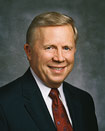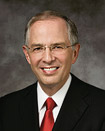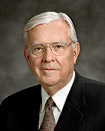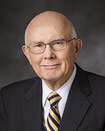Sacred Keys of the Aaronic Priesthood, by Larry M. Gibson
First Counselor in the Young Men General Presidency

In our meeting of men on Sundays (called Elders' quorum, or Priesthood), we've been discussing priesthood keys frequently the last few weeks. It all seemed to start when a young man had the Melchizedek Priesthood conferred upon him and was ordained an elder in the Church. Following the natural order, his father was the one who performed this action.
I noted that in the prayer, the father incorrectly bestowed the keys of the Melchizedek Priesthood upon his son--in addition to the various rights, duties, and responsibilities. Afterward, a member of the stake presidency who was in attendance used this slip-up as a teaching opportunity. He said that in his desires to give everything good to his son, the father had inadvertently used the wrong wording. A mini-lesson on priesthood keys followed, where it was stated that there are only four men in the ward who hold priesthood keys [of presidency]: the presidents of the quorums of elders, priests, teachers, and deacons.

As part of this instructive moment, I asked for clarification regarding the keys mentioned in the thirteenth section of the Doctrine and Covenants--the section recounting the words used by John the Baptist when conferring the Aaronic Priesthood on Joseph Smith and Oliver Cowdery. This section mentions "the keys of the ministering of angels, and of the gospel of repentance, and of baptism by immersion for the remission of sins" (D&C 13:1). We then discussed briefly that when the phrase priesthood keys is used in the Church, it usually refers to the keys of presidency, but that it is through the priesthood and its keys that lives are blessed.
In his talk, Elder Gibson quoted President Monson:
The priesthood is not really so much a gift as it is a commission to serve, a privilege to lift, and an opportunity to bless the lives of others.
Later, Elder Gibson said:
Your priesthood holds the sacred keys that open the door for all of Heavenly Father’s children to come unto His Son, Jesus Christ, and follow Him. This is provided through “the gospel of repentance, and of baptism by immersion for the remission of sins”; the weekly ordinance of the sacrament; and “the ministering of angels” (D&C 13:1; Joseph Smith—History 1:69)
I'm grateful for the priesthood, for the saving ordinances made possible through its righteous exercise, and that my family is blessed through it.
In a few months, I'll baptize my eldest child through the authority of the priesthood. A few years later, I will confer upon him the Aaronic Priesthood. I like the additional understanding I'm still getting regarding the priesthood and its keys.
And if I accidentally say something wrong while assisting with these ordinances, I'm happy it might make a nice classroom of instruction for myself and others!















